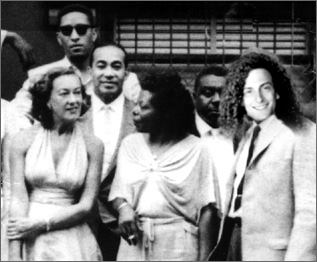While I'm in my "not here to make friends" mode (see my previous post, The Case for Vibing), I thought it would be helpful to elaborate by sharing a few examples of behaviors I (and many of my fellow musicians) consider to be deserving of a serious vibe-down. Context (open jam session vs. regular gig with guests vs. sideman gig, etc.) is important, and not all are equally vibe-worthy, but if you engage in any of these actions there's a really good chance you'll find yourself on the midnight train to Vibeville. Let's begin!
Losing the form on a blues (bad as a soloist, worse as an accompanist)
Losing the form of a tune while reading the chord changes off your phone
Texting/sexting on the bandstand
Acting like a bandleader while sitting in (e.g. trying to dictate solo order, trading, or other similar micromanagement--this is worse when sitting in on someone else's gig than on a more chaotic jam session)
Not knowing what key you sing a song in
Fumbling through the melody of a tune before the tune has started (Either you know it or you don't. Don't give it away. Especially don't do this before the band has agreed on the tune)
Noodling behind someone else's solo (I'm not talking about purposeful accompaniment, although you probably shouldn't do that either unless you know the person soloing well and know they don't mind that). Everyone can hear you, especially the soloist, and they will drop a vibe bomb on you when they're done like you wouldn't believe
Calling any of the following tunes: My Funny Valentine, Summertime, The Girl from Ipanema, My Way, Chameleon, Take Five, Freddie Freeloader (unless it's your gig, in which case knock yourself out but be sure to get some tips)
Calling a tune which the band finished playing less than 30 minutes ago
Asking someone in the band "What tune is this?" while they're playing and you are not (goes double for when you are playing)
Calling a tune with a very notey bebop head but then not playing the melody yourself (piano players, looking at you)
Calling an obscure tune (not a problem in itself) but having no backup choice if the band doesn't know it
Cutting off someone's solo on someone else's gig
Requesting something be played as a funk tune (unless it's a band which regularly plays funk)
Calling the same one or two tunes every time you sit in on every gig (and making the same mistakes every time)
Playing many choruses on a tune you obviously don't know either the changes or the form to, hoping you'll eventually get it (which usually results in ending your final chorus in the wrong place). As your high school band director said, practice at home!
But just for fun and in the interest of running the Vibe-o-rail in both directions, here are some poorly-executed vibing behaviors which may result in a serious counter-vibe:
Vibing the house band on a gig you're being invited to sit in on (for pretty much any reason!)
Vibing the bandleader on a gig he/she hired you for (sometimes this is indeed necessary, but you better be prepared to never get called again)
Vibing someone in the band for not knowing that difficult tune (26-2, Slings and Arrows, Countdown, something by Kurt Rosenwinkel) that you really want to show off on--come on, you can show off on something everybody knows (unless your licks are all for that particular tune! Vibe alert!)
Vibing someone for not wanting to play in 7/4 or a weird key at a jam session (unless those are a normal expectation of said session)
Vibing someone who's got a good attitude and is looking for pointers (save your vibes for the truly deserving!)
Vibing someone for playing the Miles version of "Well You Needn't" instead of the Monk version, or vice-versa
Vibing your fellow-sufferers on an already awful gig
Vibing the band by introducing yourself and saying, "I usually play more modern stuff than you guys" (true story!)
Vibing the entire band for not being on your level (maybe that is not the right band for you to be playing with?)
Vibing someone for vibing you over your excessive vibing
Got more? Throw 'em in the comments!









